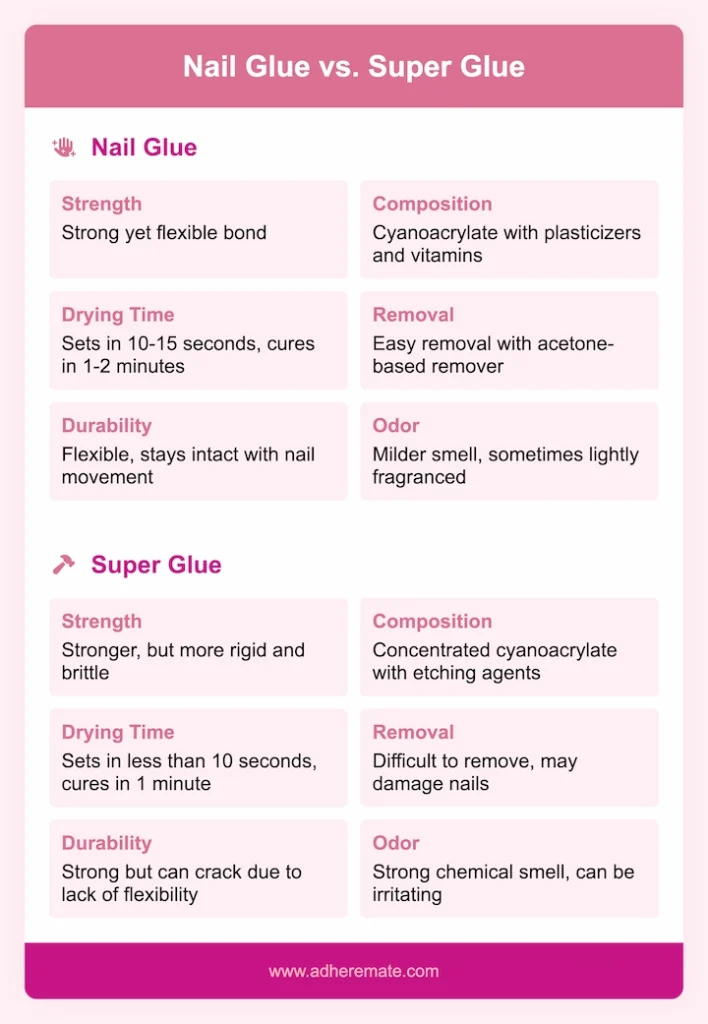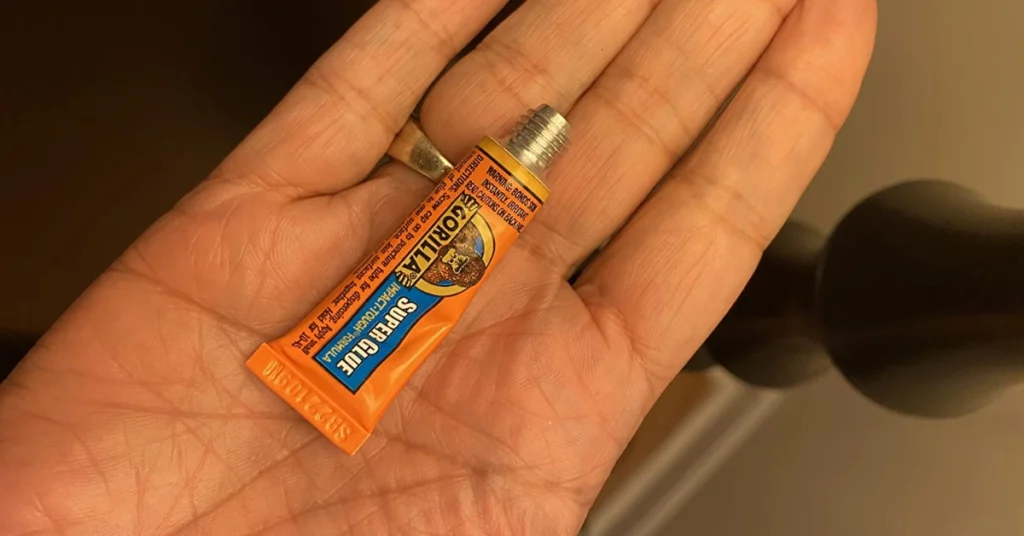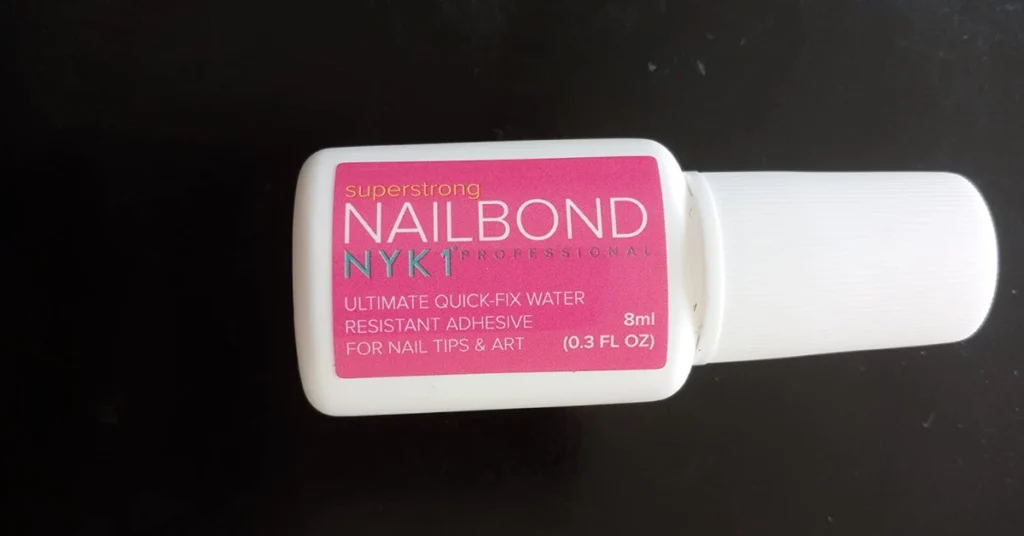Every woman has considered using super glue as nail glue at least once. The first reason is that it’s cheaper than nail glue and available in every household.
Whatever the reason, the answer is that you can use super glue to bond broken natural and artificial nails. However, using super glue on nails comes with risks.
They have the same chemical base, but nail glue is less concentrated. Moreover, the vitamin E oil and other essential ingredients in nail glue protect the skin from the base chemical.
Keep reading to learn a detailed comparison of nail glue vs. super glue.
Article Highlight
- Nail glue is less concentrated than super glue, which makes it durable.
- super glue damages the skin’s upper layer and dehydrates the nail surface.
- Super glue has a strong odor; nail glue has a light fragrance.
- Super glue contains etching agents for a strong bond.
Is Nail Glue Stronger Than Super Glue?
Super glue and nail glue have different chemical composition. That’s why super glue is stronger than nail glue. There are more reasons for super glue to be stronger.
First, super glue is designed to bond household items, automotive parts, and other materials. The manufacturer uses different ingredients to make it strong and rigid enough to hold onto materials.
The ingredients also make super glue brittle and prone to breaking under pressure or movement.
Nevertheless, nail glue is strong and durable, but in a way that is appropriate for nails. It’s strong enough to hold acrylics and secure nail art. Yet flexible enough to move naturally with nails.
So it won’t crack and is more comfortable to wear for long periods. Hence, nail glue is strong enough for nails even though it might not be as stiff as super glue.
Nail Glue vs. Super Glue

Composition
Cyanoacrylate is the base chemical for both nail glue and super glue. Nail glue also includes other ingredients like plasticizers, which make it flexible and gentle for skin contact.
On the other hand, super glue is strong and concentrated. The concentration makes it a bit too harsh for use on nails.
Drying Time
Nail glue sets in 10 to 15 seconds and cures completely in 1 to 2 minutes. While the nail glue cures, you can make small adjustments.
Super glue sets in less than 10 seconds and cures in a minute. It does not allow much time to adjust. So, it can be problematic if you’re trying to get the nails right.
Ease of Removal
You can easily take off nail glue with an acetone-based nail polish remover. Acetone dissolves the glue without damaging natural nails.
On the other hand, Super glue is much more challenging to remove. You’ll need a stronger acetone or a special remover. Plus, it can hurt your nails and skin during the process.

Residue
Nail glue usually leaves minimal residue. Any leftovers can be wiped off gently or buffed away.
On the other hand, super glue leaves a white, chalky residue. It’s hard to remove and often needs scraping or filing. Constant scraping or filling will destroy your nail beds.
Durability
Nail glue is strong enough to hold acrylics or nail tips in place for weeks. It’s durable but still flexible. Moreover, the durability helps it stay intact even when your nails move naturally.
Super glue forms a much stiffer bond. It’s strong, but the lack of flexibility means it can crack or break if your nails bend or shift.
Odor
Nail glue produces a milder smell than super glue. Some nail glues even have a light fragrance.
However, super glue has a strong chemical smell. If you’re not careful, it can be unpleasant and irritate your eyes and nose.
Resistance
Nail glue won’t lose its bond when you wash your hands or use lotion. However, it can not handle heavy chemicals.
Super glue is more resistant to heat and some chemicals. However, it’s not designed for continuous water exposure. Over time, water can weaken the bond.

Risk of Using Super Glue on Your Nails
Damages Natural Nails
Super glue contains etching agents that help it stick better to rough surfaces. But if you use it on your nails, these agents can degrade the top layer of your nails. As a result, your nails will be weak and more prone to damage.
Hard to Remove
Super glue is hard to remove, so if you put it on your nail, you have to remove it with an acetone-based remover.
Also, you must soak the nails for longer in acetone, dehydrating the nails and cuticles.
Not Made for Body Use
Super glue is not safe to use on your skin. If it touches your skin, it can cause irritation or even an allergic reaction in some people. Also, like nail glue, super glue isn’t made in clean, safe conditions.
Less Durable on Nails
Super Glue is less durable than nail glue when holding fake nails. It will weaken over time when your nail is exposed to moisture.
Risk of Burns and Skin Bonding
Super glue can bond skin together almost instantly. If fingers are glued together, this can cause painful burns or make it difficult to separate them.
Unpleasant Fumes
Super glue gives off strong fumes, which are dangerous for your nose and throat. For a more suitable adhesive option for crafting or repairs, consider reading Nail Glue vs. Krazy Glue or E6000 vs. Krazy Glue for insights into how these adhesives perform for different applications.
Editor’s Opinion
I know they might look similar, but they are really different. Nail glue is made just for your nails. It’s safer and doesn’t hurt your skin as much.
super glue can be tough on your skin and might even irritate you.
If you must use super glue in a pinch, just be careful! Always put a few layers of clear nail polish first to protect your skin.
But honestly, I recommend sticking with nail glue whenever you can. It will help keep your nails healthy and looking great!


